Issues and Approaches in International Business: A Case Study of Coca-Cola
VerifiedAdded on 2023/01/16
|9
|1809
|37
AI Summary
This document discusses the issues faced by Coca-Cola in international business, specifically the government regulations on sugary carbonated drinks. It examines the advantages and disadvantages of different approaches for addressing these issues. The recommended approach is integrated quality management. The document also provides recommendations for implementing this approach.
Contribute Materials
Your contribution can guide someone’s learning journey. Share your
documents today.
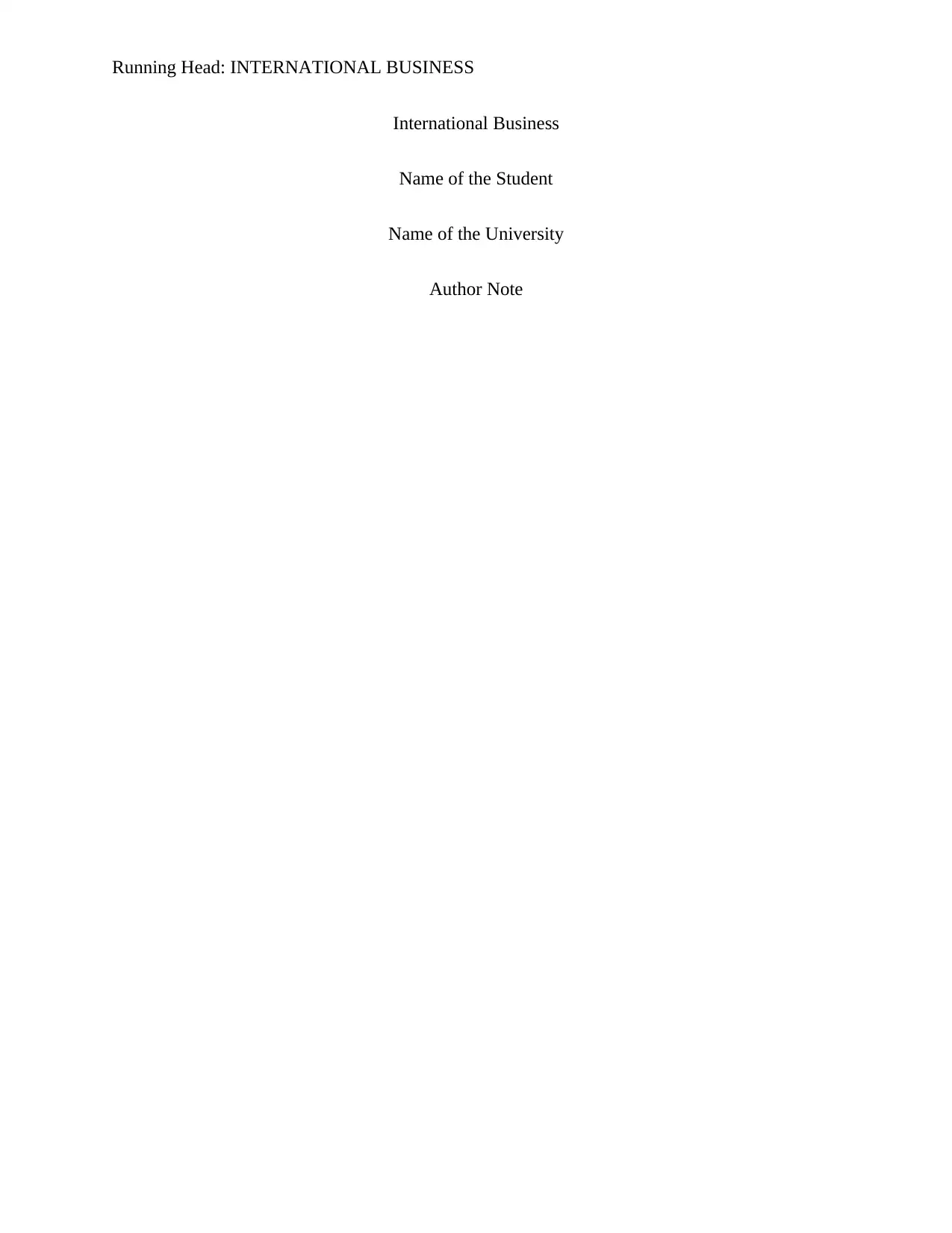
Running Head: INTERNATIONAL BUSINESS
International Business
Name of the Student
Name of the University
Author Note
International Business
Name of the Student
Name of the University
Author Note
Secure Best Marks with AI Grader
Need help grading? Try our AI Grader for instant feedback on your assignments.
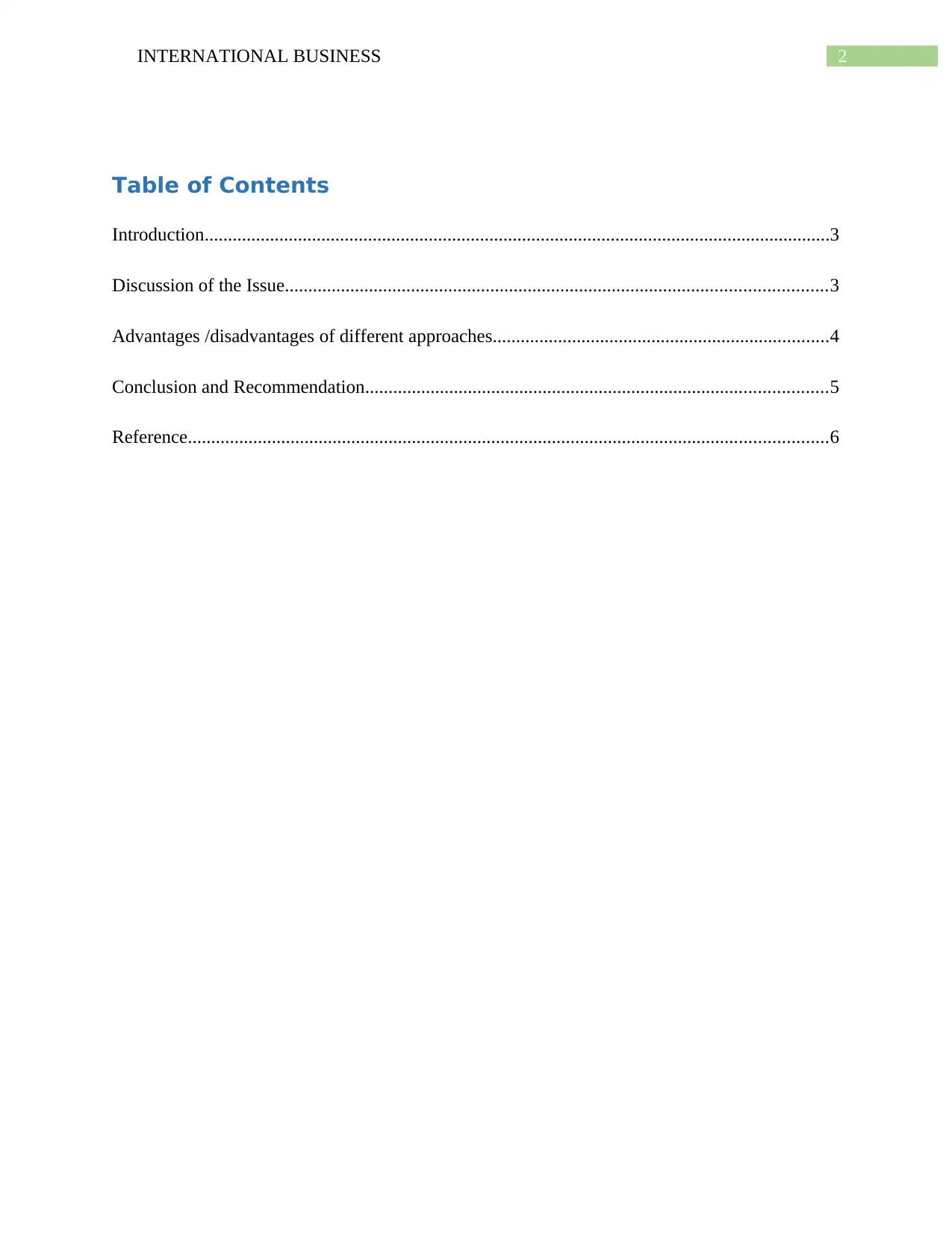
2INTERNATIONAL BUSINESS
Table of Contents
Introduction......................................................................................................................................3
Discussion of the Issue....................................................................................................................3
Advantages /disadvantages of different approaches........................................................................4
Conclusion and Recommendation...................................................................................................5
Reference.........................................................................................................................................6
Table of Contents
Introduction......................................................................................................................................3
Discussion of the Issue....................................................................................................................3
Advantages /disadvantages of different approaches........................................................................4
Conclusion and Recommendation...................................................................................................5
Reference.........................................................................................................................................6
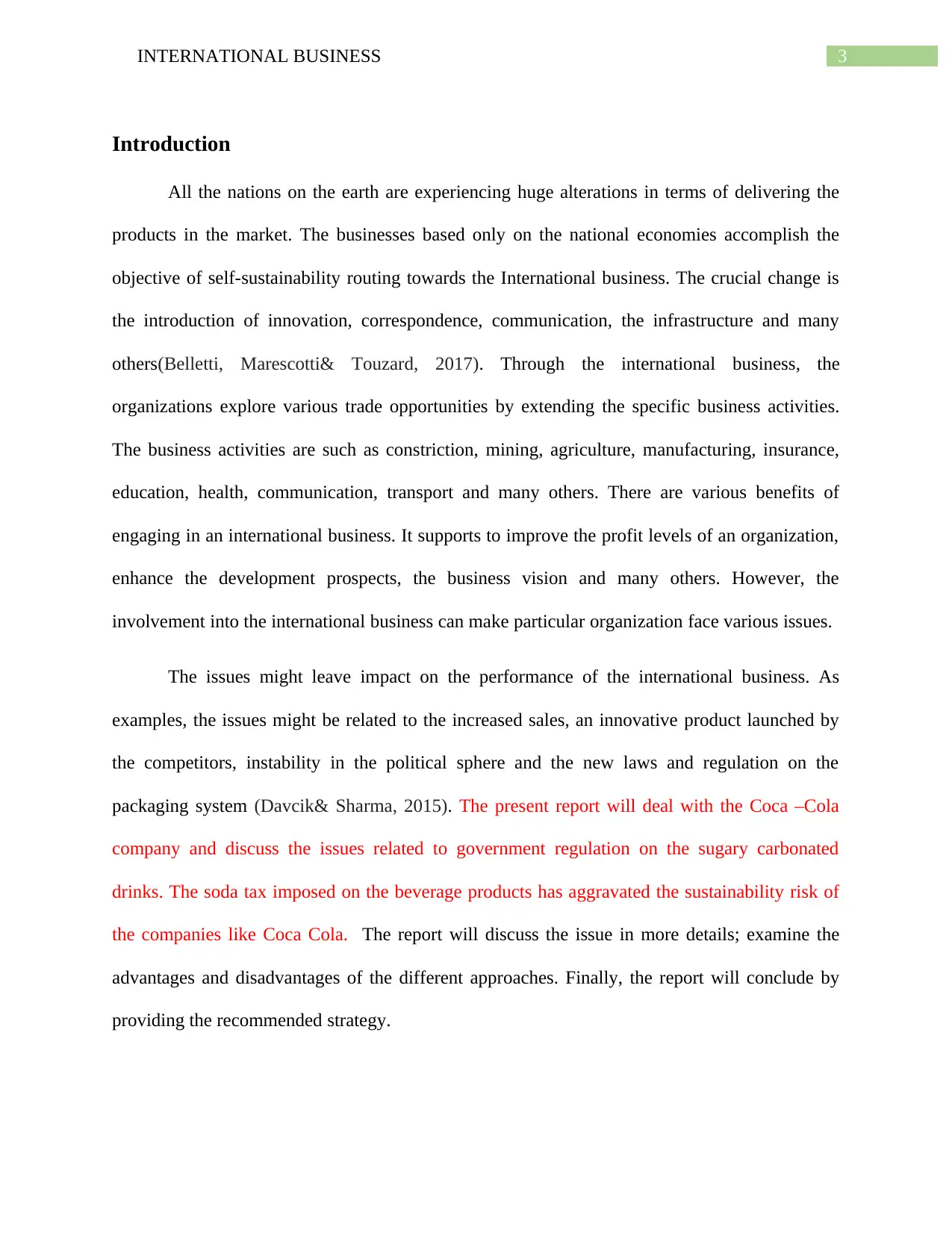
3INTERNATIONAL BUSINESS
Introduction
All the nations on the earth are experiencing huge alterations in terms of delivering the
products in the market. The businesses based only on the national economies accomplish the
objective of self-sustainability routing towards the International business. The crucial change is
the introduction of innovation, correspondence, communication, the infrastructure and many
others(Belletti, Marescotti& Touzard, 2017). Through the international business, the
organizations explore various trade opportunities by extending the specific business activities.
The business activities are such as constriction, mining, agriculture, manufacturing, insurance,
education, health, communication, transport and many others. There are various benefits of
engaging in an international business. It supports to improve the profit levels of an organization,
enhance the development prospects, the business vision and many others. However, the
involvement into the international business can make particular organization face various issues.
The issues might leave impact on the performance of the international business. As
examples, the issues might be related to the increased sales, an innovative product launched by
the competitors, instability in the political sphere and the new laws and regulation on the
packaging system (Davcik& Sharma, 2015). The present report will deal with the Coca –Cola
company and discuss the issues related to government regulation on the sugary carbonated
drinks. The soda tax imposed on the beverage products has aggravated the sustainability risk of
the companies like Coca Cola. The report will discuss the issue in more details; examine the
advantages and disadvantages of the different approaches. Finally, the report will conclude by
providing the recommended strategy.
Introduction
All the nations on the earth are experiencing huge alterations in terms of delivering the
products in the market. The businesses based only on the national economies accomplish the
objective of self-sustainability routing towards the International business. The crucial change is
the introduction of innovation, correspondence, communication, the infrastructure and many
others(Belletti, Marescotti& Touzard, 2017). Through the international business, the
organizations explore various trade opportunities by extending the specific business activities.
The business activities are such as constriction, mining, agriculture, manufacturing, insurance,
education, health, communication, transport and many others. There are various benefits of
engaging in an international business. It supports to improve the profit levels of an organization,
enhance the development prospects, the business vision and many others. However, the
involvement into the international business can make particular organization face various issues.
The issues might leave impact on the performance of the international business. As
examples, the issues might be related to the increased sales, an innovative product launched by
the competitors, instability in the political sphere and the new laws and regulation on the
packaging system (Davcik& Sharma, 2015). The present report will deal with the Coca –Cola
company and discuss the issues related to government regulation on the sugary carbonated
drinks. The soda tax imposed on the beverage products has aggravated the sustainability risk of
the companies like Coca Cola. The report will discuss the issue in more details; examine the
advantages and disadvantages of the different approaches. Finally, the report will conclude by
providing the recommended strategy.
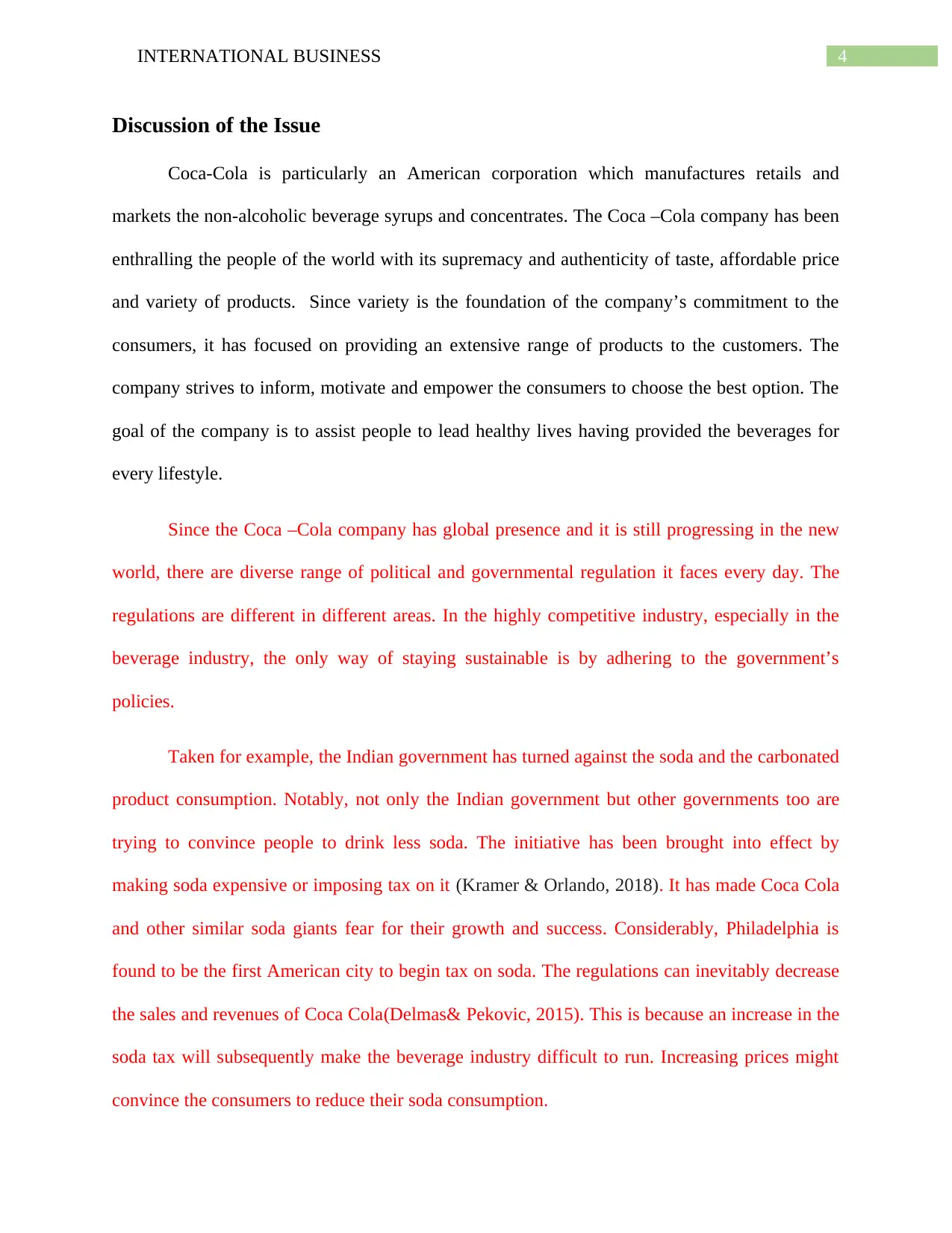
4INTERNATIONAL BUSINESS
Discussion of the Issue
Coca-Cola is particularly an American corporation which manufactures retails and
markets the non-alcoholic beverage syrups and concentrates. The Coca –Cola company has been
enthralling the people of the world with its supremacy and authenticity of taste, affordable price
and variety of products. Since variety is the foundation of the company’s commitment to the
consumers, it has focused on providing an extensive range of products to the customers. The
company strives to inform, motivate and empower the consumers to choose the best option. The
goal of the company is to assist people to lead healthy lives having provided the beverages for
every lifestyle.
Since the Coca –Cola company has global presence and it is still progressing in the new
world, there are diverse range of political and governmental regulation it faces every day. The
regulations are different in different areas. In the highly competitive industry, especially in the
beverage industry, the only way of staying sustainable is by adhering to the government’s
policies.
Taken for example, the Indian government has turned against the soda and the carbonated
product consumption. Notably, not only the Indian government but other governments too are
trying to convince people to drink less soda. The initiative has been brought into effect by
making soda expensive or imposing tax on it (Kramer & Orlando, 2018). It has made Coca Cola
and other similar soda giants fear for their growth and success. Considerably, Philadelphia is
found to be the first American city to begin tax on soda. The regulations can inevitably decrease
the sales and revenues of Coca Cola(Delmas& Pekovic, 2015). This is because an increase in the
soda tax will subsequently make the beverage industry difficult to run. Increasing prices might
convince the consumers to reduce their soda consumption.
Discussion of the Issue
Coca-Cola is particularly an American corporation which manufactures retails and
markets the non-alcoholic beverage syrups and concentrates. The Coca –Cola company has been
enthralling the people of the world with its supremacy and authenticity of taste, affordable price
and variety of products. Since variety is the foundation of the company’s commitment to the
consumers, it has focused on providing an extensive range of products to the customers. The
company strives to inform, motivate and empower the consumers to choose the best option. The
goal of the company is to assist people to lead healthy lives having provided the beverages for
every lifestyle.
Since the Coca –Cola company has global presence and it is still progressing in the new
world, there are diverse range of political and governmental regulation it faces every day. The
regulations are different in different areas. In the highly competitive industry, especially in the
beverage industry, the only way of staying sustainable is by adhering to the government’s
policies.
Taken for example, the Indian government has turned against the soda and the carbonated
product consumption. Notably, not only the Indian government but other governments too are
trying to convince people to drink less soda. The initiative has been brought into effect by
making soda expensive or imposing tax on it (Kramer & Orlando, 2018). It has made Coca Cola
and other similar soda giants fear for their growth and success. Considerably, Philadelphia is
found to be the first American city to begin tax on soda. The regulations can inevitably decrease
the sales and revenues of Coca Cola(Delmas& Pekovic, 2015). This is because an increase in the
soda tax will subsequently make the beverage industry difficult to run. Increasing prices might
convince the consumers to reduce their soda consumption.
Secure Best Marks with AI Grader
Need help grading? Try our AI Grader for instant feedback on your assignments.
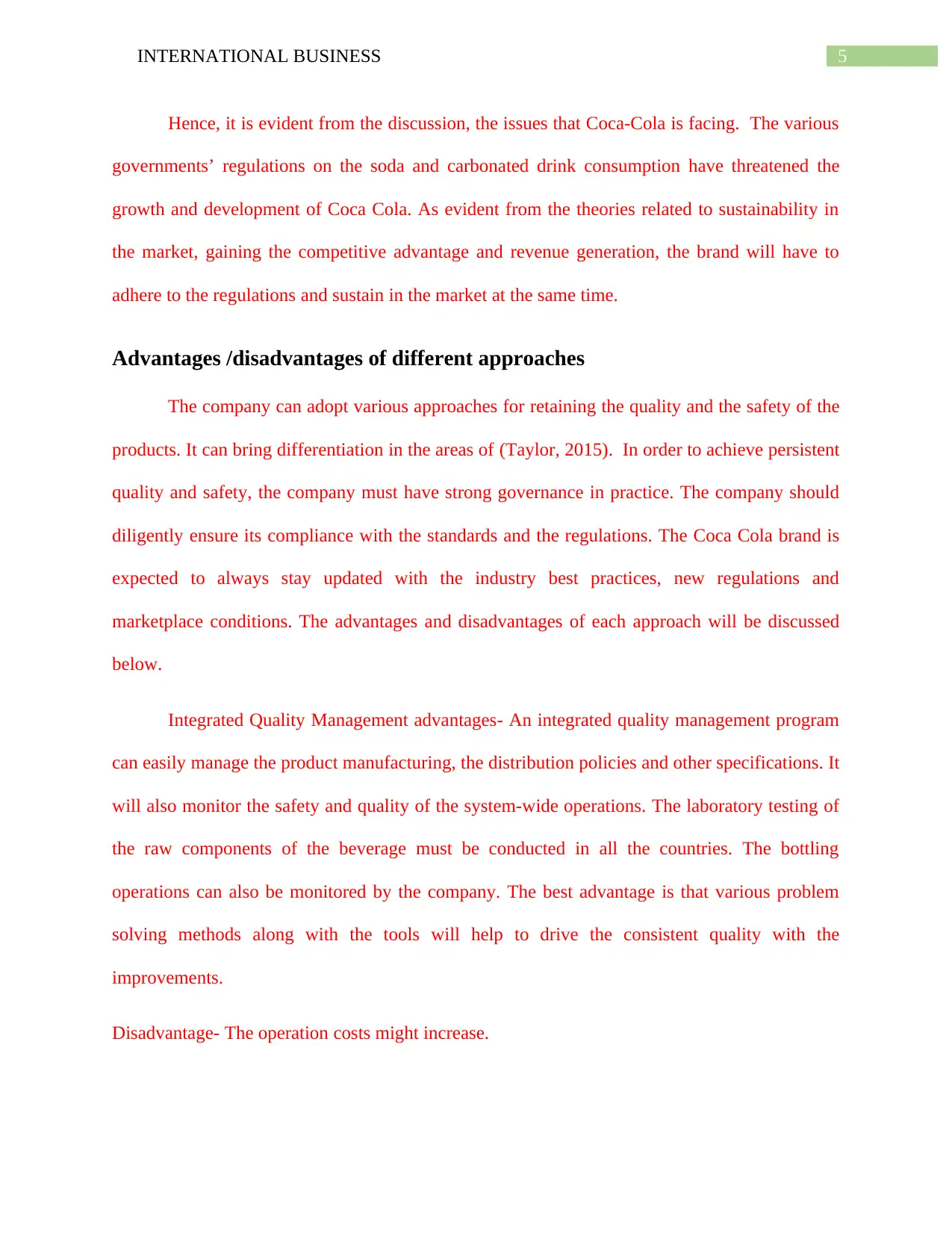
5INTERNATIONAL BUSINESS
Hence, it is evident from the discussion, the issues that Coca-Cola is facing. The various
governments’ regulations on the soda and carbonated drink consumption have threatened the
growth and development of Coca Cola. As evident from the theories related to sustainability in
the market, gaining the competitive advantage and revenue generation, the brand will have to
adhere to the regulations and sustain in the market at the same time.
Advantages /disadvantages of different approaches
The company can adopt various approaches for retaining the quality and the safety of the
products. It can bring differentiation in the areas of (Taylor, 2015). In order to achieve persistent
quality and safety, the company must have strong governance in practice. The company should
diligently ensure its compliance with the standards and the regulations. The Coca Cola brand is
expected to always stay updated with the industry best practices, new regulations and
marketplace conditions. The advantages and disadvantages of each approach will be discussed
below.
Integrated Quality Management advantages- An integrated quality management program
can easily manage the product manufacturing, the distribution policies and other specifications. It
will also monitor the safety and quality of the system-wide operations. The laboratory testing of
the raw components of the beverage must be conducted in all the countries. The bottling
operations can also be monitored by the company. The best advantage is that various problem
solving methods along with the tools will help to drive the consistent quality with the
improvements.
Disadvantage- The operation costs might increase.
Hence, it is evident from the discussion, the issues that Coca-Cola is facing. The various
governments’ regulations on the soda and carbonated drink consumption have threatened the
growth and development of Coca Cola. As evident from the theories related to sustainability in
the market, gaining the competitive advantage and revenue generation, the brand will have to
adhere to the regulations and sustain in the market at the same time.
Advantages /disadvantages of different approaches
The company can adopt various approaches for retaining the quality and the safety of the
products. It can bring differentiation in the areas of (Taylor, 2015). In order to achieve persistent
quality and safety, the company must have strong governance in practice. The company should
diligently ensure its compliance with the standards and the regulations. The Coca Cola brand is
expected to always stay updated with the industry best practices, new regulations and
marketplace conditions. The advantages and disadvantages of each approach will be discussed
below.
Integrated Quality Management advantages- An integrated quality management program
can easily manage the product manufacturing, the distribution policies and other specifications. It
will also monitor the safety and quality of the system-wide operations. The laboratory testing of
the raw components of the beverage must be conducted in all the countries. The bottling
operations can also be monitored by the company. The best advantage is that various problem
solving methods along with the tools will help to drive the consistent quality with the
improvements.
Disadvantage- The operation costs might increase.
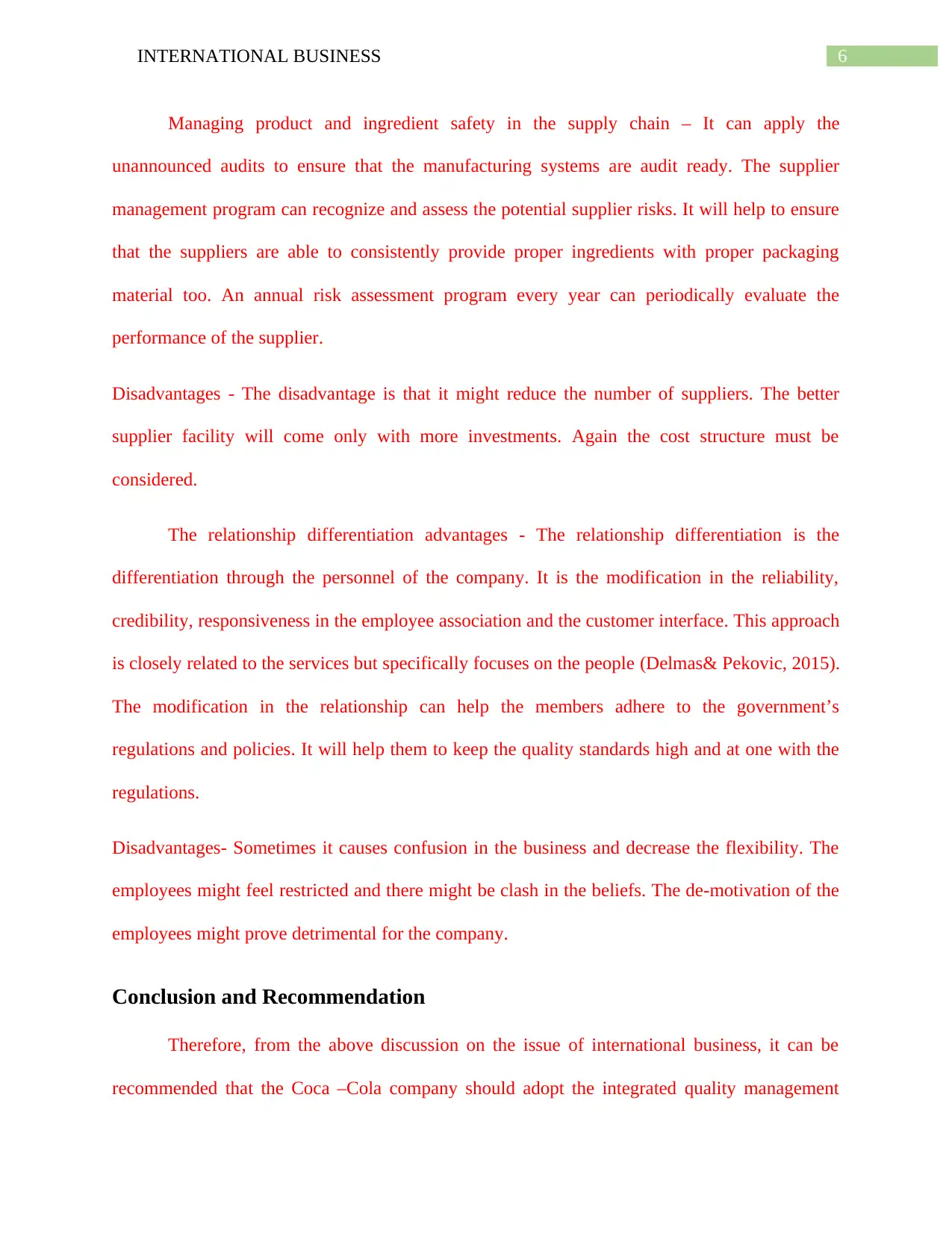
6INTERNATIONAL BUSINESS
Managing product and ingredient safety in the supply chain – It can apply the
unannounced audits to ensure that the manufacturing systems are audit ready. The supplier
management program can recognize and assess the potential supplier risks. It will help to ensure
that the suppliers are able to consistently provide proper ingredients with proper packaging
material too. An annual risk assessment program every year can periodically evaluate the
performance of the supplier.
Disadvantages - The disadvantage is that it might reduce the number of suppliers. The better
supplier facility will come only with more investments. Again the cost structure must be
considered.
The relationship differentiation advantages - The relationship differentiation is the
differentiation through the personnel of the company. It is the modification in the reliability,
credibility, responsiveness in the employee association and the customer interface. This approach
is closely related to the services but specifically focuses on the people (Delmas& Pekovic, 2015).
The modification in the relationship can help the members adhere to the government’s
regulations and policies. It will help them to keep the quality standards high and at one with the
regulations.
Disadvantages- Sometimes it causes confusion in the business and decrease the flexibility. The
employees might feel restricted and there might be clash in the beliefs. The de-motivation of the
employees might prove detrimental for the company.
Conclusion and Recommendation
Therefore, from the above discussion on the issue of international business, it can be
recommended that the Coca –Cola company should adopt the integrated quality management
Managing product and ingredient safety in the supply chain – It can apply the
unannounced audits to ensure that the manufacturing systems are audit ready. The supplier
management program can recognize and assess the potential supplier risks. It will help to ensure
that the suppliers are able to consistently provide proper ingredients with proper packaging
material too. An annual risk assessment program every year can periodically evaluate the
performance of the supplier.
Disadvantages - The disadvantage is that it might reduce the number of suppliers. The better
supplier facility will come only with more investments. Again the cost structure must be
considered.
The relationship differentiation advantages - The relationship differentiation is the
differentiation through the personnel of the company. It is the modification in the reliability,
credibility, responsiveness in the employee association and the customer interface. This approach
is closely related to the services but specifically focuses on the people (Delmas& Pekovic, 2015).
The modification in the relationship can help the members adhere to the government’s
regulations and policies. It will help them to keep the quality standards high and at one with the
regulations.
Disadvantages- Sometimes it causes confusion in the business and decrease the flexibility. The
employees might feel restricted and there might be clash in the beliefs. The de-motivation of the
employees might prove detrimental for the company.
Conclusion and Recommendation
Therefore, from the above discussion on the issue of international business, it can be
recommended that the Coca –Cola company should adopt the integrated quality management
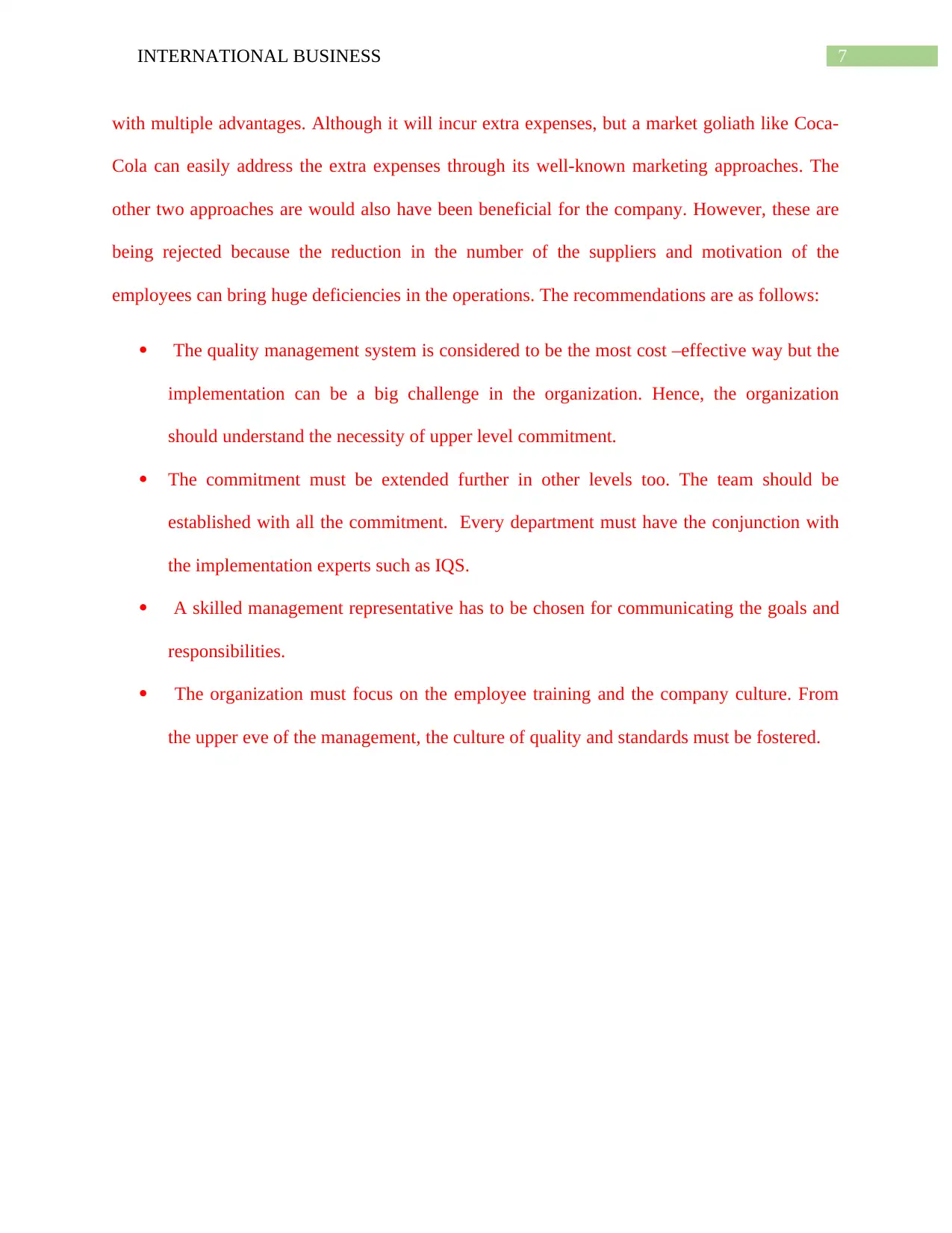
7INTERNATIONAL BUSINESS
with multiple advantages. Although it will incur extra expenses, but a market goliath like Coca-
Cola can easily address the extra expenses through its well-known marketing approaches. The
other two approaches are would also have been beneficial for the company. However, these are
being rejected because the reduction in the number of the suppliers and motivation of the
employees can bring huge deficiencies in the operations. The recommendations are as follows:
The quality management system is considered to be the most cost –effective way but the
implementation can be a big challenge in the organization. Hence, the organization
should understand the necessity of upper level commitment.
The commitment must be extended further in other levels too. The team should be
established with all the commitment. Every department must have the conjunction with
the implementation experts such as IQS.
A skilled management representative has to be chosen for communicating the goals and
responsibilities.
The organization must focus on the employee training and the company culture. From
the upper eve of the management, the culture of quality and standards must be fostered.
with multiple advantages. Although it will incur extra expenses, but a market goliath like Coca-
Cola can easily address the extra expenses through its well-known marketing approaches. The
other two approaches are would also have been beneficial for the company. However, these are
being rejected because the reduction in the number of the suppliers and motivation of the
employees can bring huge deficiencies in the operations. The recommendations are as follows:
The quality management system is considered to be the most cost –effective way but the
implementation can be a big challenge in the organization. Hence, the organization
should understand the necessity of upper level commitment.
The commitment must be extended further in other levels too. The team should be
established with all the commitment. Every department must have the conjunction with
the implementation experts such as IQS.
A skilled management representative has to be chosen for communicating the goals and
responsibilities.
The organization must focus on the employee training and the company culture. From
the upper eve of the management, the culture of quality and standards must be fostered.
Paraphrase This Document
Need a fresh take? Get an instant paraphrase of this document with our AI Paraphraser
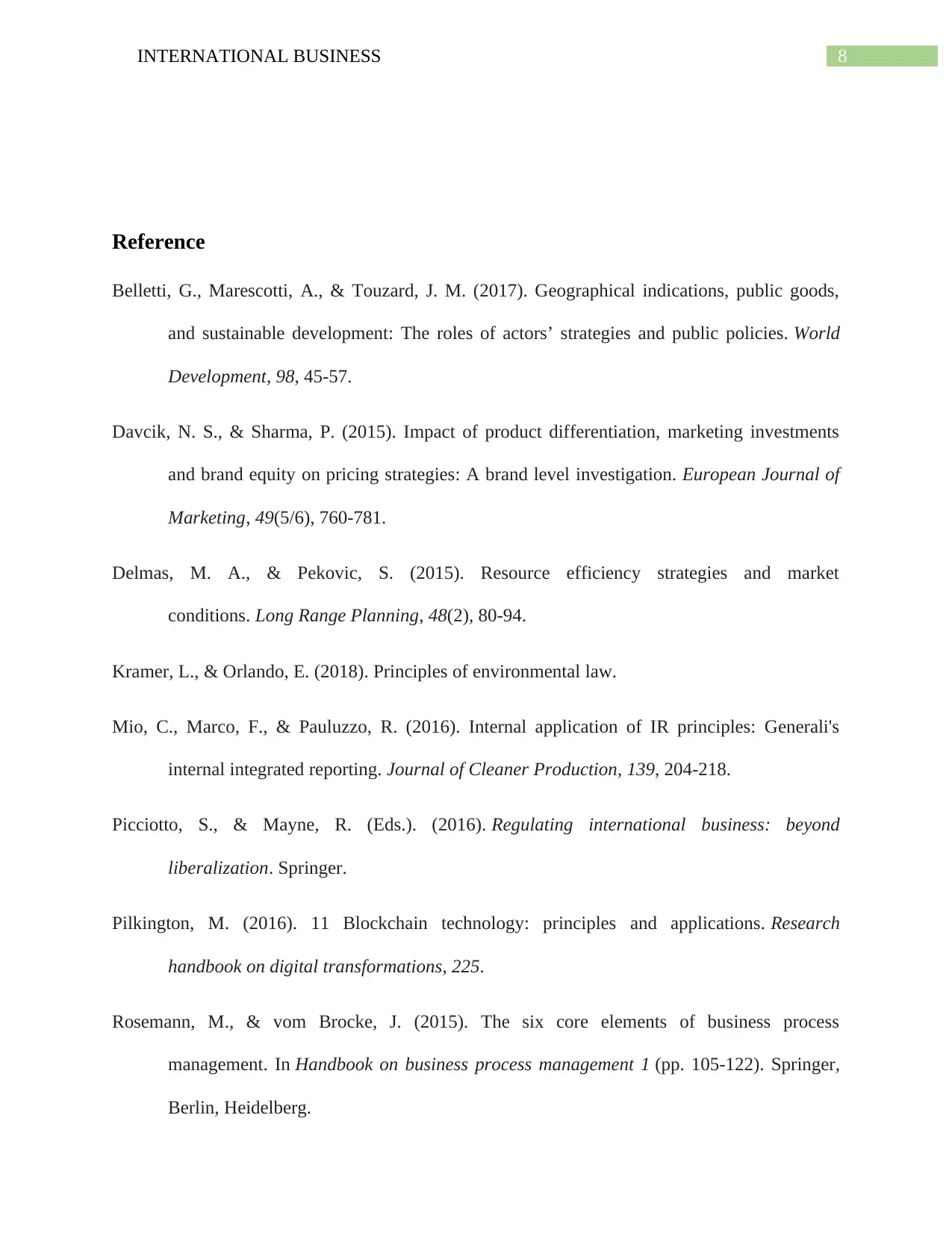
8INTERNATIONAL BUSINESS
Reference
Belletti, G., Marescotti, A., & Touzard, J. M. (2017). Geographical indications, public goods,
and sustainable development: The roles of actors’ strategies and public policies. World
Development, 98, 45-57.
Davcik, N. S., & Sharma, P. (2015). Impact of product differentiation, marketing investments
and brand equity on pricing strategies: A brand level investigation. European Journal of
Marketing, 49(5/6), 760-781.
Delmas, M. A., & Pekovic, S. (2015). Resource efficiency strategies and market
conditions. Long Range Planning, 48(2), 80-94.
Kramer, L., & Orlando, E. (2018). Principles of environmental law.
Mio, C., Marco, F., & Pauluzzo, R. (2016). Internal application of IR principles: Generali's
internal integrated reporting. Journal of Cleaner Production, 139, 204-218.
Picciotto, S., & Mayne, R. (Eds.). (2016). Regulating international business: beyond
liberalization. Springer.
Pilkington, M. (2016). 11 Blockchain technology: principles and applications. Research
handbook on digital transformations, 225.
Rosemann, M., & vom Brocke, J. (2015). The six core elements of business process
management. In Handbook on business process management 1 (pp. 105-122). Springer,
Berlin, Heidelberg.
Reference
Belletti, G., Marescotti, A., & Touzard, J. M. (2017). Geographical indications, public goods,
and sustainable development: The roles of actors’ strategies and public policies. World
Development, 98, 45-57.
Davcik, N. S., & Sharma, P. (2015). Impact of product differentiation, marketing investments
and brand equity on pricing strategies: A brand level investigation. European Journal of
Marketing, 49(5/6), 760-781.
Delmas, M. A., & Pekovic, S. (2015). Resource efficiency strategies and market
conditions. Long Range Planning, 48(2), 80-94.
Kramer, L., & Orlando, E. (2018). Principles of environmental law.
Mio, C., Marco, F., & Pauluzzo, R. (2016). Internal application of IR principles: Generali's
internal integrated reporting. Journal of Cleaner Production, 139, 204-218.
Picciotto, S., & Mayne, R. (Eds.). (2016). Regulating international business: beyond
liberalization. Springer.
Pilkington, M. (2016). 11 Blockchain technology: principles and applications. Research
handbook on digital transformations, 225.
Rosemann, M., & vom Brocke, J. (2015). The six core elements of business process
management. In Handbook on business process management 1 (pp. 105-122). Springer,
Berlin, Heidelberg.
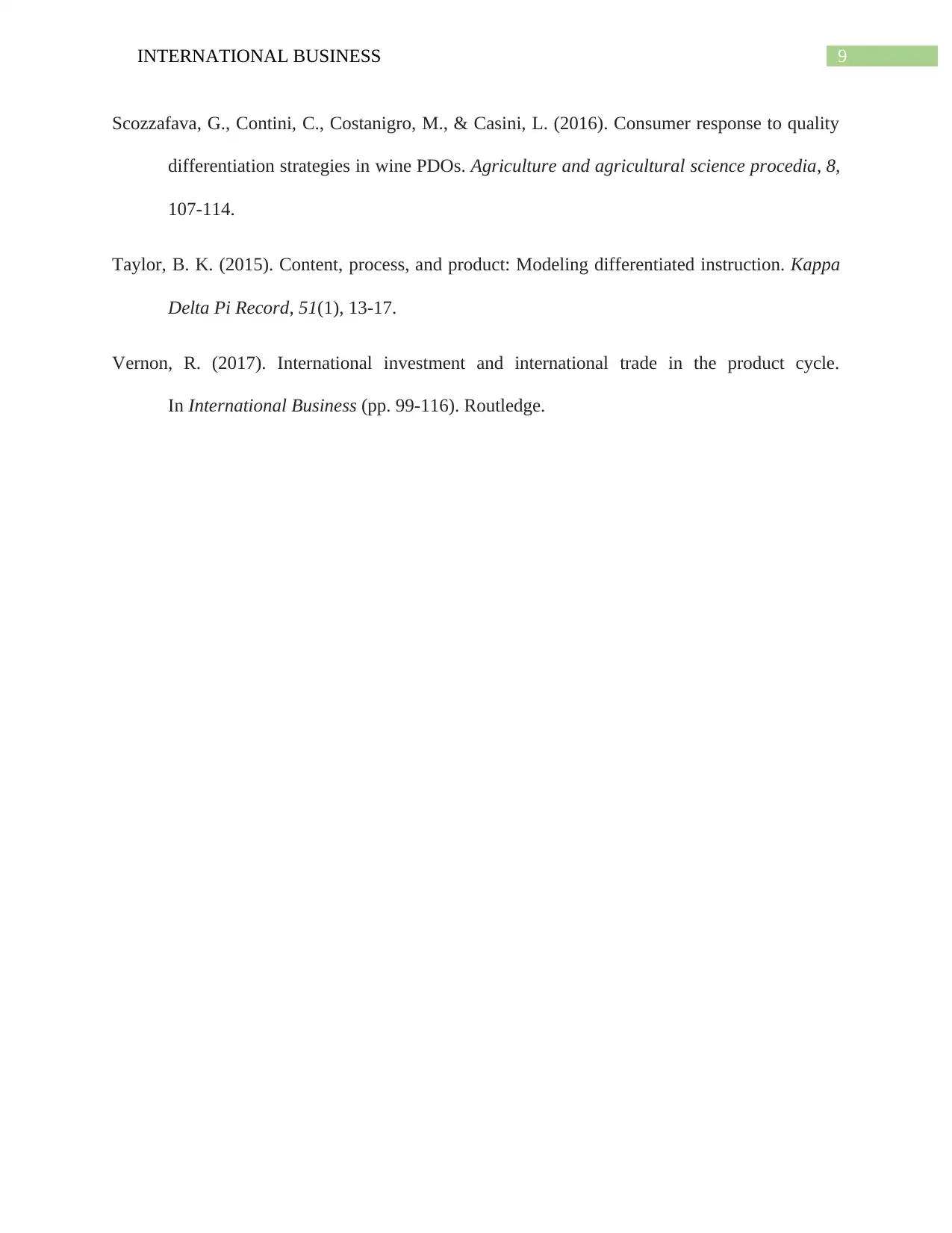
9INTERNATIONAL BUSINESS
Scozzafava, G., Contini, C., Costanigro, M., & Casini, L. (2016). Consumer response to quality
differentiation strategies in wine PDOs. Agriculture and agricultural science procedia, 8,
107-114.
Taylor, B. K. (2015). Content, process, and product: Modeling differentiated instruction. Kappa
Delta Pi Record, 51(1), 13-17.
Vernon, R. (2017). International investment and international trade in the product cycle.
In International Business (pp. 99-116). Routledge.
Scozzafava, G., Contini, C., Costanigro, M., & Casini, L. (2016). Consumer response to quality
differentiation strategies in wine PDOs. Agriculture and agricultural science procedia, 8,
107-114.
Taylor, B. K. (2015). Content, process, and product: Modeling differentiated instruction. Kappa
Delta Pi Record, 51(1), 13-17.
Vernon, R. (2017). International investment and international trade in the product cycle.
In International Business (pp. 99-116). Routledge.
1 out of 9
Related Documents
Your All-in-One AI-Powered Toolkit for Academic Success.
+13062052269
info@desklib.com
Available 24*7 on WhatsApp / Email
![[object Object]](/_next/static/media/star-bottom.7253800d.svg)
Unlock your academic potential
© 2024 | Zucol Services PVT LTD | All rights reserved.





